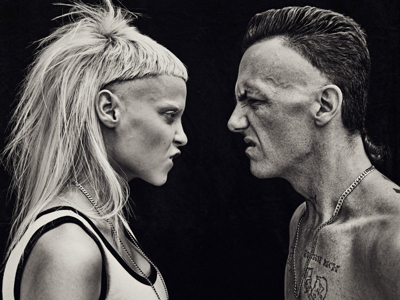In a recent article panning Chappie, the new Neill Blomkamp film starring Die Antwoord, The Washington Post refers to the white South African hip-hop duo as "non actors." The implication is that the two outrageous personas Yolandi Visser and Ninja aren't capable of more than simply playing themselves in Blomkamp's film, a sentimental dystopian comedy that mashes up Robocop with Short Circuit in the crime-ridden gutters of Johannesburg. The Post warns that Visser and Ninja "better not quit their day jobs" ... because their acting is "really bad." Heeding that advice, Die Antwoord rolls into town ready to unleash its up-tempo rave-rap mayhem in the wake of Chappie's release.
Now here's the thing: Acting is already Visser and Ninja's day job. If you haven't already caught on, here's a primer: Against all odds, Die Antwoord became South Africa's most internationally visible pop export of the day by affecting a thuggish demeanor. Visser and Ninja are so precise in their ability to shift their weight between hostility, over-the-top hedonism and self-deprecation that they essentially parody the art of self-parody. Like hip-hop's answer to Larry David's TV version of himself, Die Antwoord is celebrated for saying things out loud that the rest of us wouldn't dare utter in public. With Blomkamp's film, in which they play themselves playing themselves playing themselves, the duo adds another layer to their satire.
In their previous life as the alternative hip-hop outfit MaxNormal.TV, Ninja was a Sacha Baron Cohen-like figure who went by his birth name Watkin Tudor Jones. He wore three-piece suits while rapping in the guise of a corporate motivational speaker. Today, Jones is covered in tattoos. He glowers at cameras and interviewers, raps about his "big African dick" and says "fok" ("fuck" with an Afrikaans accent) ad nauseam. But on occasion he lets on that he's just pulling our leg. Meanwhile, compared to her more conservatively modish MaxNormal look, Visser has transformed herself into a helium-voiced Teutonic pixie who sports Marilyn Manson-style body-horror garb and black contact lenses that accentuate an alien-like sexuality.
Other than the fact that both bands employ hip-hop as the delivery system for vague social commentary, MaxNormal.TV and Die Antwoord have little in common. But when Jones suggested in a 2011 video statement that the band's use of the words "faggot" and "nigga" could teach American audiences about inclusiveness, he demonstrated why Die Antwoord has struck a collective nerve. In Chappie, Visser and Ninja — who in real life have a daughter together — play criminals who, no lie, become loving parental figures to a robot with feelings. To put this in context, the band's Friday night show will likely open with its DJ spinning a tune that contains the words "DJ Hi-Tek will fuck you in your ass, faggot."
When examined closely — just like when Visser implores DJ Hi-Tek to "drop the fuckin' beat, nigga!" on the band's latest album, last year's Donker Mag — there's actually a more subversively confrontational rationale to Die Antwoord's liberal use of epithets than meets the eye. (Not so much, perhaps, when Visser recently posted "Drake is a massive faggot" on Instagram.) And though their film appearance threatens to soften their edge, Donker remains a thoroughly convincing hip-hop album even as it winks at you. Stuffed with interlude skits and jarring mood shifts, the album cleverly re-creates the disjointed feel of classic rap records, at a time when full-lengths appear to be losing relevance.
However awkward Die Antwoord comes off onscreen, Visser and Ninja clearly look like they're in their natural habitat in the athletic intensity of their live show. If you can imagine a more audacious and foul-mouthed version of Prodigy with body-dysmorphic photos as backdrops, then you're in the ballpark. Much as Blomkamp's film makes a statement about our humanity by using artificial intelligence, Die Antwoord sets a new bar for kicking ass onstage while in character. Watching Visser and Ninja twirl about the stage in a barrage of obscenities, it's clear they're aspiring to be more than just a hip-hop Spinal Tap. In a recent interview with Boing Boing, Ninja says that if music and films are made in South Africa, that's usually a sign they are "B-grade." With Die Antwoord, that's not the case.





